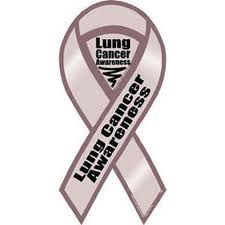November is Lung Cancer Awareness Month, an initiative led by the Roy Castle Lung Cancer Foundation and Macmillan Cancer Support which brings together a number of other charities and the Department of Health. Did you know that lung cancer claims 33,500 lives every year, making it the leading cause of cancer death in the UK? We have just had Breast Cancer Awareness Month, and there's a national breast screening programme - but, in fact, lung cancer kills more people than breast cancer, prostate cancer, and leukaemia put together. Unfortunately, despite its importance, lung cancer attracts only 3% of cancer research funding, according to the British Lung Foundation.
Cigarette and second-hand smoke and cancer go together in public perception. But non-smokers and ex-smokers get lung cancer too, and the cause is often exposure to carcinogens like certain industrial chemicals, asbestos and radon gas. There is also mounting evidence that air pollution plays a role in lung cancer. In a recent study, researchers in the United States and Canada found a link between exposure to PM2.5 pollution and lung cancer. PM2.5 stands for particulate matter consisting of particles diameter 2.5 microns or less. These tiny particles are readily inhaled and are known to contribute to heart and lung disease.
Drawing on the population of the long-running Cancer Prevention Study, the team followed more than 180,000 non-smokers for 26 years, during which time 1,100 participants died of lung cancer. The study population was drawn from 50 different states, plus Puerto Rico, and their postcodes were used to estimate how much PM2.5 air pollution each person had been exposed to, measured as micrograms of particles per cubic meter of air. These levels varied with the location from a low of 6 to a high of 38 and fell over time to an overall average of 17. The study found that each extra 10 units of PM2.5 exposure were associated with an increase in lung cancer risk of between 15 and 27%. Although this risk is small, compared to the risk posed by smoking, it is not insignificant, particularly since people cannot usually help being exposed to air pollution (whereas they can quit smoking). Also, there's been other research tying air pollution to lung cancer. A study from China showed an increased risk of lung cancer with exposure to indoor air pollution caused by burning coal and wood for heating. There have also been studies in Europe that show a link between exposure to soot and vehicle exhaust and lung cancer.
Between 10 to 15% of lung cancer cases occur in people who have never smoked, most of them women. So do not assume that if you do not smoke, you cannot get lung cancer. Unfortunately, awareness of symptoms seems to below - the Roy Castle Lung Cancer Foundation carried out a survey and only one in ten of those asked knew that a persistent (more than three weeks) a cough could mean lung cancer. Here are the other symptoms that the Lung Cancer Awareness Month people would like you to be aware of:
- Worsening or change of a long-standing cough
- Repeated chest infections
- Coughing up blood
- Unexplained persistent breathlessness
- Unexplained persistent tiredness
- Unexplained persistent weight loss
- Persistent chest and/or shoulder pain.
Of course, there are many 'innocent' explanations for these symptoms, but they should be checked out because lung cancer is curable if caught early enough.
Ref.:
- www.lunguk.org
- www.roycastle.org
- http://ajrccm.atsjournals.org/cgi/content/abstract/201106-1011OCv1
- http://www.cancer.org/Research/ResearchProgramsFunding/cancer-prevention-study-overviews




